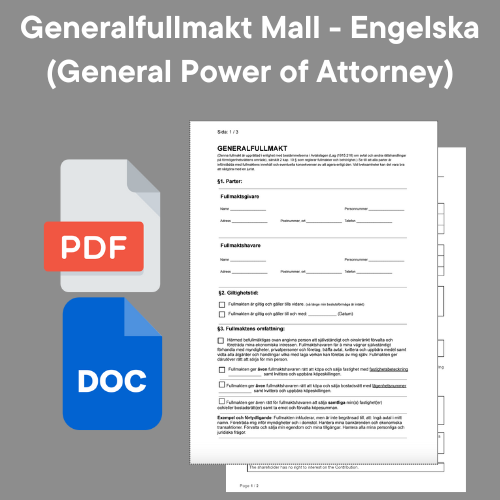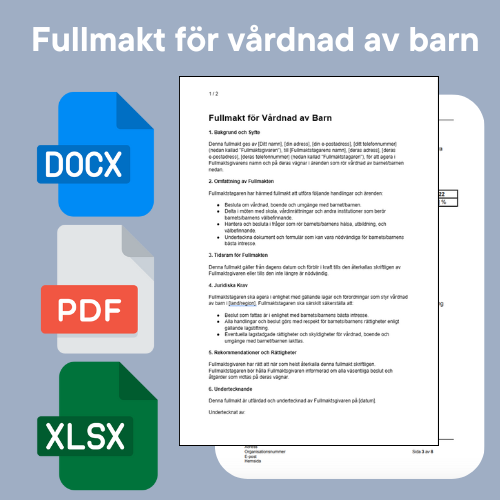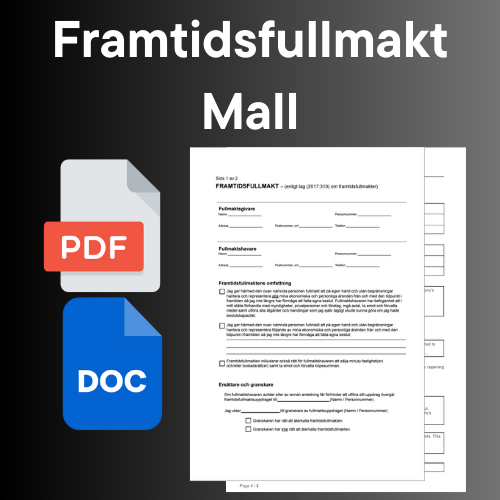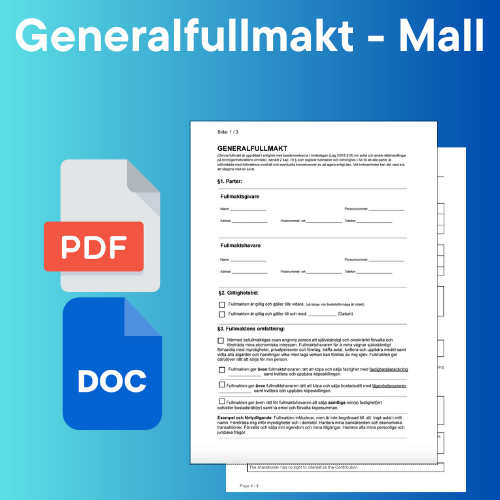Guide on General Powers of Attorney
Share
Comprehensive Guide to General Powers of Attorney
Table of Contents
- What is a General Power of Attorney?
- When can I Create a General Power of Attorney?
- How long does a General Power of Attorney last?
- Can I create a General Power of Attorney and a Future Power of Attorney at the same time?
- Differences, Advantages and Disadvantages compared to Other Powers of Attorney
- Requirements for a General Power of Attorney
- What Does the Act Say About General Powers of Attorney?
- General power of attorney for limited liability companies
- Important to Consider when Establishing a General Power of Attorney
- Common Mistakes When Establishing a General Power of Attorney
- FAQ - Frequently Asked Questions about Power of Attorney
- Our Templates regarding General Powers of Attorney
- Form requirements for General Powers of Attorney
- Can I Use a Power of Attorney Abroad?
- Who can Witness a Power of Attorney?
- Difference between General and Simple Power of Attorney
- What is a Power of Attorney?
What is a General Power of Attorney?
A general power of attorney is a legal document that gives the power of attorney the right to act in the name of the power of attorney in all legal and financial matters. It is very broad and can cover many different actions, from handling banking matters to selling property.
When can I Create a General Power of Attorney?
You can establish a general power of attorney at any time, as long as you have legal capacity. It is especially useful when you know you will be absent or unable to manage your affairs yourself, for example in case of illness or travel.
How long does a General Power of Attorney last?
A general power of attorney is valid until revoked by the power of attorney or until the power of attorney dies. However, it is important to specify the validity period in the document if there is a time limit.
Can I create a General Power of Attorney and a Future Power of Attorney at the same time?
Yes, you can establish both a general power of attorney and a future power of attorney at the same time. The general power of attorney applies immediately, while the future power of attorney only comes into effect when you can no longer make your own decisions due to illness or other incapacity.
Differences, Advantages and Disadvantages compared to Other Powers of Attorney
Here are some differences, advantages and disadvantages of general power of attorney compared to other types of power of attorney:
-
Advantages:
- Gives extensive powers to the proxy holder.
- Can handle many different cases with a single document.
-
Disadvantages:
- Can be abused if it falls into the wrong hands.
- May be too broad and lack specific instructions.
-
Differences:
- A specific power of attorney is limited to specific actions, while the general power of attorney is comprehensive.
- A power of attorney for the future only comes into effect when the person giving the power of attorney can no longer make his own decisions.
Requirements for a General Power of Attorney
For a general power of attorney to be valid and legally binding, it must meet certain requirements:
- The full name and social security number of the person giving the power of attorney and the holder of the power of attorney.
- A clear description of the powers given to the power of attorney.
- The signature and date of the person giving the power of attorney.
- Witness signatures may be required depending on the area of use.
What Does the Act Say About General Powers of Attorney?
General powers of attorney are regulated by the Contracts Act (1915:218). The law establishes that the power of attorney is binding for both the power of attorney and the power of attorney as long as it is clearly worded and signed. For certain types of powers of attorney, additional laws and regulations may apply.
General power of attorney for limited liability companies
A general power of attorney can be used in a limited company to give a person the right to act on behalf of the company. This may include signing contracts, handling banking matters or representing the company in legal matters. To establish a general power of attorney for a limited company, follow these steps:
- Specify the company name and corporate registration number.
- Specify the proxy holder's name and powers.
- Obtain signatures from authorized representatives within the company.
Important to Consider when Establishing a General Power of Attorney
Here are some important points to consider when drawing up a general power of attorney:
- Be clear about the powers given.
- Ensure that all information is correct and complete.
- Consider having witnesses to strengthen the power of attorney's validity.
- Update the power of attorney as necessary to reflect changes in circumstances.
Common Mistakes When Establishing a General Power of Attorney
Avoid these common mistakes when drawing up a general power of attorney:
- Unclear description of powers.
- No time limit for the validity of the power of attorney.
- Incorrect or incomplete information.
- No witness when required.
FAQ - Frequently Asked Questions about Power of Attorney
Here are some frequently asked questions and answers about general powers of attorney:
-
How long is a general power of attorney valid for?
A general power of attorney is valid until revoked by the power of attorney or until the power of attorney dies. -
Can I revoke a general power of attorney?
Yes, you can revoke a general power of attorney at any time as long as you have legal capacity. -
Does a general power of attorney need to be witnessed?
It is not always necessary, but having witnesses can strengthen the validity of the power of attorney. -
What happens if the authorizer is declared incompetent?
A general power of attorney ceases to apply if the power of attorney is declared incompetent.
Our Templates regarding General Powers of Attorney
We offer professionally designed General Power of Attorney templates that can be customized to your specific needs. Our templates are legally correct and easy to use, making it easy for you to manage formal reminders in different contexts.
Visit our document templates page today to find the perfect general power of attorney template for your needs and ensure your formal reminders are both effective and professional.
Form requirements for General Powers of Attorney
A general power of attorney must contain certain specific information to be valid:
- The full name and social security number of the person giving the power of attorney and the holder of the power of attorney.
- A clear description of the powers given to the power of attorney.
- The signature and date of the person giving the power of attorney.
- Witness signatures may be required depending on the area of use.
Can I Use a Power of Attorney Abroad?
Yes, but additional steps may be required to ensure the power of attorney is valid abroad, such as having it apostilled or translated by an authorized translator. It is important to check the requirements of the specific country where the power of attorney is to be used.
Who can Witness a Power of Attorney?
Witnesses should be of legal age and have no vested interest in the power of attorney. It is best to have two independent witnesses who can attest that the power of attorney was signed voluntarily and with full understanding of its meaning.
Difference between General and Simple Power of Attorney
A general power of attorney gives extensive powers to the holder of the power of attorney, while a simple power of attorney is limited to specific actions. General powers of attorney are used to handle a wide range of matters, while simple powers of attorney are more limited in their scope of use.
What is a Power of Attorney?
A power of attorney for the future is a power of attorney that only comes into effect when the person giving the power of attorney can no longer make their own decisions due to illness or other incapacity. It is a way of ensuring that one's wishes are respected even when one cannot express them himself. Read more about Future powers of attorney on our information page: Comprehensive guide on future powers of attorney




